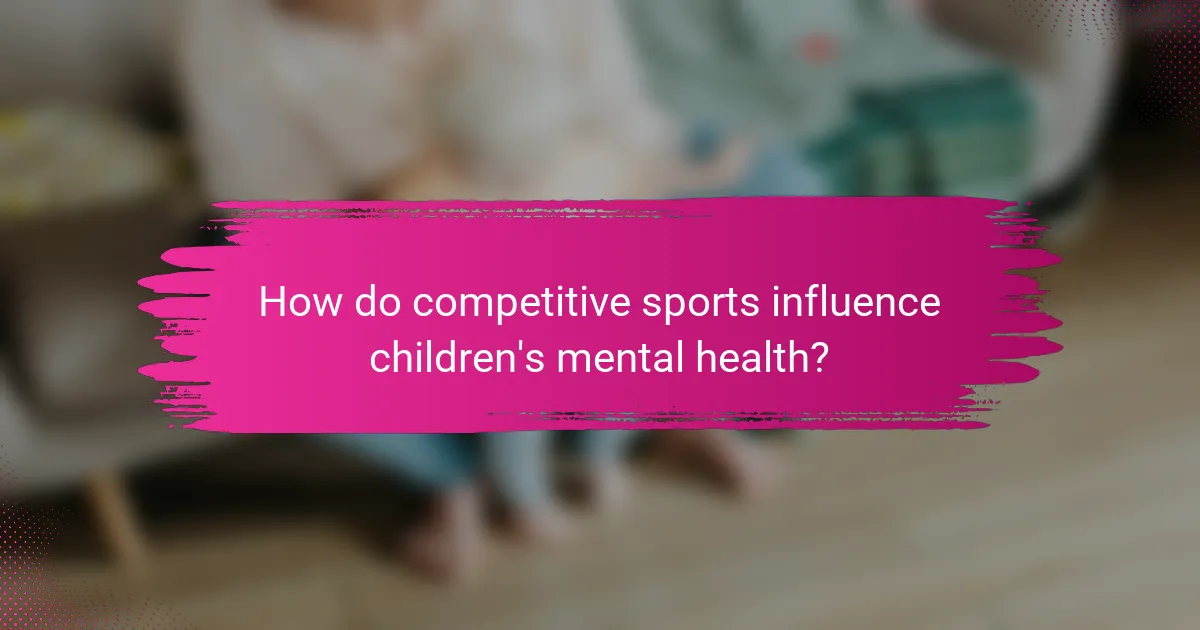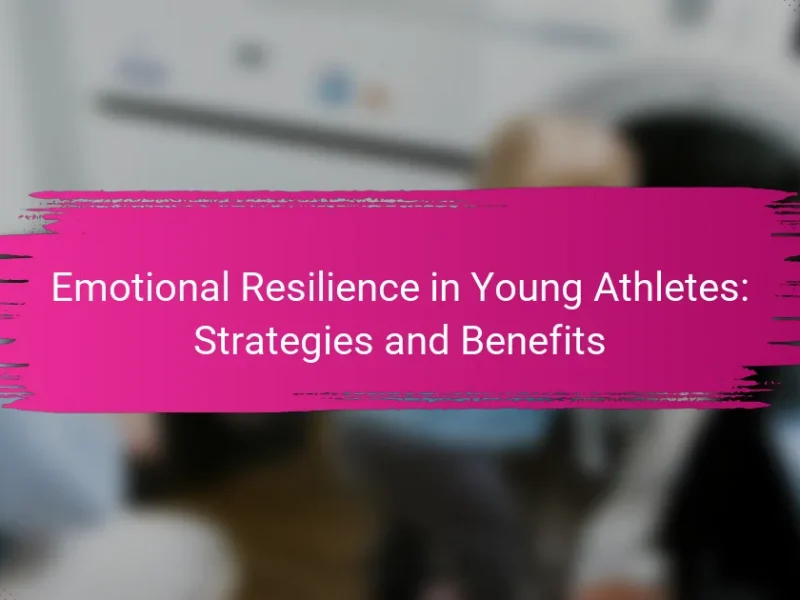Competitive sports can significantly enhance children’s mental health by boosting self-esteem and fostering social skills. However, they also present challenges like performance anxiety and fear of failure. Parents and coaches play a crucial role in supporting young athletes by promoting a positive environment and open communication. Understanding the impact of competition on mental well-being is essential for nurturing resilience and overall happiness in children.

How do competitive sports influence children’s mental health?
Competitive sports positively influence children’s mental health by enhancing self-esteem, social skills, and resilience. Participation fosters teamwork and discipline, which contribute to emotional well-being. Studies indicate that active children experience lower levels of anxiety and depression. Regular engagement in sports provides a unique outlet for stress relief, promoting a balanced mental state.
What are the common mental health benefits of participating in competitive sports?
Participating in competitive sports offers numerous mental health benefits for children. These include enhanced self-esteem, improved social skills, and reduced anxiety levels.
Engagement in sports fosters teamwork and discipline, which contribute to a sense of belonging. Additionally, physical activity releases endorphins, promoting a positive mood. Research indicates that children involved in sports experience lower rates of depression compared to their peers.
Moreover, competitive sports can teach valuable life skills, such as resilience and goal-setting, which are essential for mental well-being. These attributes collectively support a healthier mindset and emotional stability in children.
How does teamwork in sports contribute to emotional well-being?
Teamwork in sports significantly enhances emotional well-being by fostering social connections and promoting resilience. Engaging in team activities helps children develop communication skills and build friendships, which are vital for emotional support. As a result, children involved in competitive sports often experience reduced anxiety and improved self-esteem. Studies indicate that teamwork can lead to a 30% increase in feelings of belonging among young athletes. This sense of community is crucial for mental health, as it provides a support network during challenging times.
What role does physical fitness play in mental health improvement?
Physical fitness significantly enhances children’s mental health by promoting emotional resilience and social skills. Engaging in competitive sports fosters teamwork, discipline, and self-esteem, leading to improved mood and reduced anxiety. Studies show that children involved in sports experience lower rates of depression and higher overall well-being. Additionally, physical activity releases endorphins, which contribute to a positive mental state.
How can competitive sports boost self-esteem in children?
Competitive sports significantly enhance children’s self-esteem by fostering a sense of achievement and belonging. Participation in these activities allows children to develop skills, set and achieve goals, and receive positive reinforcement from peers and coaches.
As a result, children often experience increased confidence and improved social interactions. A study indicated that children involved in sports report higher self-esteem levels compared to those who are not engaged in such activities. This boost in self-esteem can lead to better mental health outcomes and resilience in facing challenges.
Moreover, the unique attribute of teamwork in competitive sports teaches children the value of collaboration, further enhancing their self-worth. Engaging in sports can also provide a rare opportunity for children to experience success, which reinforces their belief in their capabilities.
What are the potential mental health risks associated with competitive sports?
Competitive sports can pose mental health risks for children, including anxiety, depression, and burnout. High pressure to perform may lead to stress and decreased self-esteem. Research indicates that athletes, particularly in youth sports, may experience elevated levels of performance anxiety, which can affect overall well-being. Additionally, the competitive environment might foster a fear of failure, impacting mental resilience. Balancing competition with enjoyment is crucial for safeguarding children’s mental health.
How can pressure to win affect children’s mental health?
Pressure to win can negatively impact children’s mental health by increasing anxiety and stress. Competitive sports often emphasize performance, leading to fear of failure and low self-esteem. Research indicates that children may experience burnout and depression when they feel overwhelmed by expectations. Additionally, the pressure can hinder their enjoyment of the sport, affecting their overall well-being.
What are the signs of burnout in young athletes?
Signs of burnout in young athletes include chronic fatigue, decreased performance, loss of motivation, irritability, and withdrawal from sports. These symptoms indicate mental health impacts stemming from competitive pressures. Research shows that high competition levels can lead to emotional exhaustion, affecting overall well-being. Recognizing these signs early can help in implementing supportive measures to foster a healthier sports environment for children.

What unique mental health challenges do children face in competitive sports?
Children in competitive sports face unique mental health challenges, including performance anxiety, pressure to succeed, and fear of failure. These challenges can lead to stress, burnout, and decreased self-esteem. A study found that 30% of young athletes experience significant anxiety related to competition. Additionally, the intense focus on winning can overshadow the enjoyment of the sport, affecting overall mental well-being. Parents and coaches must recognize these issues to support children’s mental health effectively.
How do gender differences impact mental health in youth sports?
Gender differences significantly impact mental health in youth sports, influencing emotional well-being and social dynamics. Boys often face pressure to display toughness, while girls may experience anxiety related to performance and acceptance. Research indicates that girls are more susceptible to stress and negative body image, affecting their participation and enjoyment in sports. Conversely, boys might engage in more aggressive behaviors, which can lead to conflicts and emotional challenges. Understanding these differences is crucial for creating supportive environments that foster positive mental health in all young athletes.
What cultural factors influence children’s mental health in sports?
Cultural factors significantly influence children’s mental health in sports by shaping their experiences and perceptions. Family expectations can create pressure, impacting self-esteem and enjoyment. Community values may dictate the importance of competition, affecting children’s motivation and emotional well-being. Additionally, cultural attitudes towards failure and success can either encourage resilience or foster anxiety. Social support networks, including peers and coaches, play a crucial role in mitigating stress and promoting positive mental health outcomes.

What rare mental health effects can arise from competitive sports?
Competitive sports can lead to rare mental health effects in children, such as performance anxiety and social isolation. These conditions may arise from intense pressure to succeed and the competitive environment. Research indicates that about 10% of young athletes experience significant anxiety, which can hinder their overall well-being. Additionally, some children may develop a fear of failure, impacting their self-esteem and motivation. The unique attribute of competitive sports is the high expectations placed on young athletes, which can exacerbate these mental health challenges.
How can extreme competitiveness lead to anxiety disorders?
Extreme competitiveness can trigger anxiety disorders in children by creating high-pressure environments. This pressure often leads to excessive stress and fear of failure. Research indicates that children engaged in highly competitive sports may experience heightened anxiety levels due to performance expectations. As a result, their mental health may be compromised, leading to symptoms such as nervousness and social withdrawal. Long-term exposure to this stress can result in chronic anxiety disorders, affecting overall well-being and development.
What are the long-term mental health implications of early specialization in sports?
Early specialization in sports can lead to long-term mental health issues such as anxiety, depression, and burnout. These implications arise from intense pressure and reduced social interactions. Research indicates that children who specialize early may struggle with identity outside of sports, impacting their self-esteem and overall well-being. Additionally, the risk of injury and subsequent withdrawal from sports can exacerbate feelings of isolation and inadequacy.

How can parents support their children’s mental health in competitive sports?
Parents can support their children’s mental health in competitive sports by fostering a positive environment. Encouragement and praise for effort, rather than just outcomes, can enhance self-esteem. Open communication about feelings helps children express concerns and reduces anxiety. Setting realistic expectations prevents undue pressure and promotes enjoyment in sports. Teaching resilience through setbacks can build coping skills. Lastly, ensuring a balance between sports and other activities supports overall well-being.
What strategies can parents use to foster a healthy sports environment?
Parents can foster a healthy sports environment by emphasizing enjoyment over winning. They should encourage effort, provide positive reinforcement, and promote teamwork. Setting realistic expectations helps reduce pressure on children. Additionally, maintaining open communication about feelings can support mental well-being. Creating a supportive community around sports enhances children’s confidence and social skills.
How can parents recognize and address mental health issues in young athletes?
Parents can recognize mental health issues in young athletes by observing changes in behavior, mood, and performance. Signs may include increased anxiety, withdrawal from activities, or declining performance levels. Addressing these issues involves open communication, encouraging a balanced approach to sports, and seeking professional help if necessary. Research indicates that up to 35% of young athletes experience significant mental health challenges, highlighting the need for proactive measures. Regular check-ins and fostering a supportive environment can help mitigate these risks and promote overall well-being.
What role does communication play in supporting children’s mental health in sports?
Effective communication significantly enhances children’s mental health in sports by fostering emotional support and understanding. Open dialogue between coaches, parents, and athletes promotes a positive environment, reducing anxiety and building confidence. Studies show that supportive communication correlates with improved performance and well-being. Additionally, teaching children to express their feelings helps them navigate competitive pressures, ultimately leading to healthier coping mechanisms.

What best practices can coaches implement to promote mental well-being in young athletes?
Coaches can implement several best practices to promote mental well-being in young athletes. First, they should foster a positive environment that emphasizes effort over winning. This encourages resilience and reduces performance anxiety.
Regular communication is vital; coaches should check in with athletes about their feelings and stress levels. This builds trust and opens dialogue about mental health. Incorporating mindfulness and relaxation techniques into training can also help athletes manage stress effectively.
Additionally, coaches should educate themselves about signs of mental distress and know when to refer athletes to mental health professionals. Creating a balanced schedule that allows for rest and recovery supports overall well-being.
How can coaches create a positive team culture?
Coaches can create a positive team culture by fostering open communication and mutual respect. Encouraging teamwork enhances children’s social skills and emotional well-being. Celebrating individual and team achievements builds confidence, contributing to a supportive environment. Regular feedback helps children understand their strengths and areas for improvement, promoting resilience and growth.
What training should coaches receive to address mental health issues?
Coaches should receive training in mental health awareness, communication skills, and crisis intervention. This training helps them recognize signs of mental health issues and provide appropriate support. Programs should focus on developing empathy, understanding stress management, and fostering a positive team environment. Research indicates that informed coaches can significantly reduce anxiety and depression in young athletes.
What are the most common mistakes coaches make regarding athletes’ mental health?
Coaches often overlook the importance of mental health, leading to several common mistakes. They may prioritize performance over well-being, neglecting athletes’ emotional needs. Additionally, coaches might fail to recognize signs of stress or anxiety, misinterpret them as lack of effort. They may also lack training in mental health awareness, which can hinder their ability to support athletes effectively. Lastly, coaches might create a high-pressure environment that exacerbates mental health issues, leading to burnout or withdrawal from the sport.


